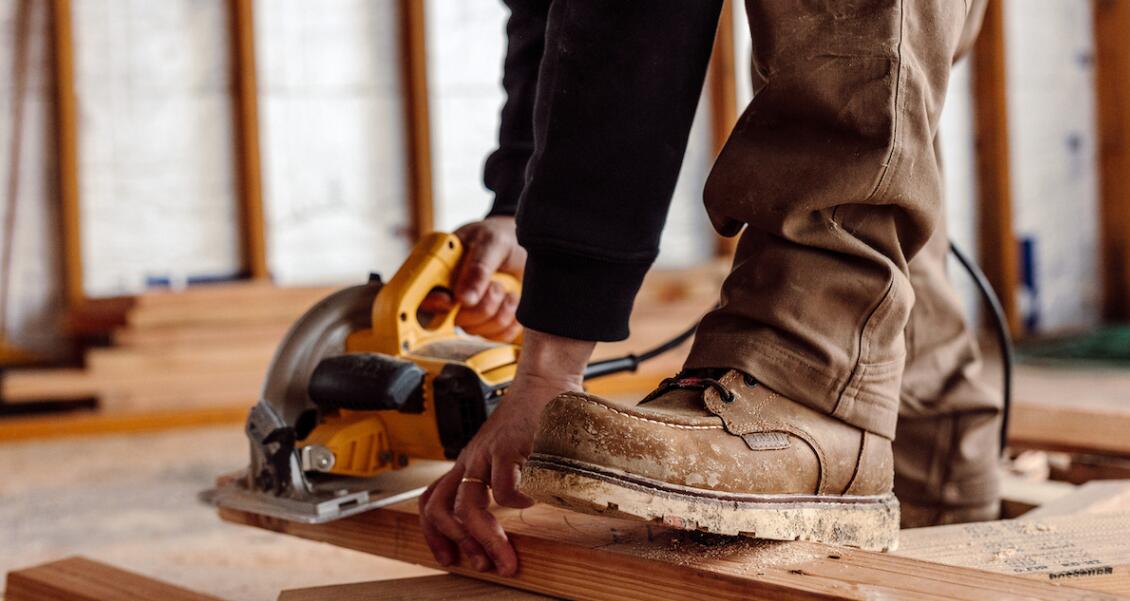Workwear brand Brunt is breaking new ground with its first wholesale accounts.
Starting Thursday, Brunt’s footwear and apparel will be available in 23 retail partners, for a total of 110 stores across the U.S. Participating retailers include Saf-Gard, Shoeteria, Vanderloops, Haney Shoes, Blue Collar, Trav’s Outfitters, Chuck’s Boots and Workwear Safety. In addition, as part of the launch, Brunt has redeveloped its existing work boots, refitting them with new technology such as improved slip resistance and cushioning, based on customer feedback. About 80% of the reformatted assortment is available now, with the remaining 20% to debut by June.
Until this month, Brunt, which launched in September 2020, has focused on direct-to-consumer sales through its website. The company has managed to gain a solid following online by appealing to workers in trades like construction and trucking. Brunt has repeatedly exceeded projections; its boots sold out 15 times over Brunt’s first 18 months, it had 200% year-over-year growth in 2022 and it raised $20 million in a Series B round two years ago. During Black Friday 2023, Brunt sold a million dollars’ worth of merchandise.
Now, Brunt is essentially doubling the size of its market by expanding into wholesale, CEO and founder Eric Girouard told Modern Retail. “This is the most transformative moment in company history since the day we launched it,” he said. Girouard hopes to achieve a 50/50 split between DTC and wholesale in the next five years or so, although he acknowledged Brunt is “not taking our foot off the gas on the growth of our website and digital channel.”
Historically, workwear has been a wholesale-driven category, as many customers like to try on boots in person and compare different models. Popular boot wholesalers today include Boot Barn, Dick’s Sporting Goods and Bass Pro Shops, which carry brands such as Wolverine, Carhartt, Timberland Pro, Keen, Ariat and Thorogood. Shoppers can also buy work boots via Amazon and Walmart.
As a digital-only business, Brunt decided it wanted to enter wholesale about a year ago, but it was careful not to rush the process, Girouard said. “We wanted to take our time,” he explained. “We said we’d rather do it right and do it slower, and luckily, the digital business continued to scale.” To help with the process, in October 2023, Brunt brought in a new president, Chris Heffernan, who built out wholesale businesses at Keen and Timberland Pro.
For years, workwear stores had expressed interest in carrying Brunt, Girouard said. “We had made a ton of noise in the digital space with our digital marketing, so a lot of retailers had been reaching out to us,” he explained. “Retailers were saying people walked into their stores and asked to try on Brunt boots.” In August, Brunt invited interested retailers to a summit at its headquarters to meet Girouard and the team. Brunt ultimately picked wholesale partners that it trusted to represent the brand according to its standards, Girouard said. Brunt also took location into account, picking retailers spread out across the country for broader distribution.
One of Brunt’s new retail partners is Work World, which has more than 20 stores on the West Coast. Tim Spangler, the company’s CEO, had followed Brunt “for quite a while,” he told Modern Retail, and his customers and employees repeatedly expressed interest in the brand.
“The amount of followers those guys have, the kind of buzz they’ve created, is exciting all by itself,” Spangler said of Brunt. “But then, when you look at the product… it’s modern product for a modern consumer. In the workwear space, that’s something we’ve been looking for for a while… something that appeals more to that millennial consumer who’s making up a bigger and bigger part of the workforce.”
The majority of the brands that Work World carries have been around for decades, Spangler said, and as a digitally-native brand, Brunt stood out. Industry players like Wrangler and Dickies have long dominated workwear, but over the past decade, smaller DTC brands like Brunt, Tilit, Figs and Up In Smoke have popped up to cater to specific groups of workers such as those working in construction zones, kitchens, hospitals or welding shops. By catering to certain employees, these brands have managed to tap into niche, but growing, markets.
As a DTC business, Brunt controlled all aspects of its manufacturing and marketing, and making the jump to wholesale was not without its challenges, Girouard acknowledged. Chief among this has been figuring out a way to manage inventory. Brunt has repeatedly sold out online, but “that’s a lot harder in wholesale,” Girouard said, as each store needs enough boots in enough sizes for customers to test out and purchase. Brunt has increased its inventory as a result and is still in the process of figuring out how to balance the two.
While some DTC brands have held off on going into wholesale, many do so to increase their reach and distribution and capitalize on growing demand. In addition, “as we’ve been seeing customer acquisition costs continue to increase for these DTC brands, wholesale is a great way to expand and be able to do that sometimes at a really cost-effective upgrade,” Brad Jashinsky, director analyst at Gartner, told Modern Retail.
At the same time, “there is an art and a science” in moving into wholesale, Jashinsky explained. With wholesale, more partners come into play, including those in manufacturing, distribution, warehouses and supply chain. In addition, many retailers have their own requirements when it comes to product barcodes or labels, providing more hoops for brands to jump through. “It’s not one simple equation,” Jashinsky said. “I think that can be the most challenging part, building those relationships with retailers and with those partners to make it work.”
Brunt is eager to scale its wholesale footprint but is not putting pressure on itself around revenue for this first year, Girouard said. Brunt may consider opening its own stores down the line, although that may not happen for five years or so, he said. “We have to be conscious of our retail partners [and] that we’re not competing with them and creating that friction,” Girouard added. “The foreseeable future is… that these 23 partners can continue to grow and scale just with their own stores, and then the universe of those partners can continue to expand.”



